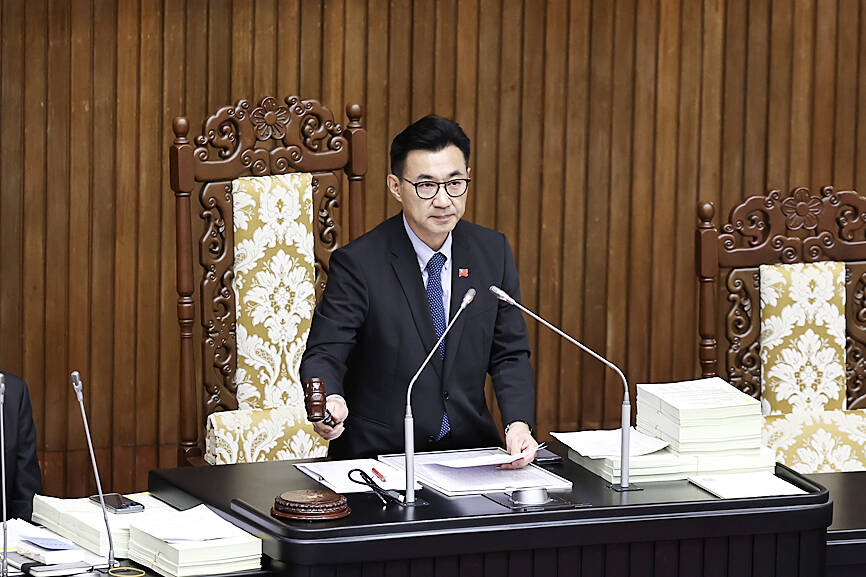Amendments to the Communication Security and Surveillance Act (通訊保障及監察法) on Friday passed a third reading at the legislature, allowing prosecutors to access network traffic records for investigative purposes.
The amendments to the act, one of four bills to combat fraud, were passed unanimously.
The amendments define “network traffic records” as the telecom device identification data, Internet protocol addresses, location information, communication time, quantity of data usage, domain names, application service types and protocols, and other records that do not involve communication content.

Photo: CNA
Prosecutors may apply to courts for a warrant to access the Internet traffic records if there are facts leading to the belief that a user’s records and information are relevant to the investigation of a case, the amendments say.
Judicial police officers may also obtain access warrants after filing a request to prosecutors.
The amendments also revised the access restrictions on communication records and user information, and broadened offenses.
The restriction limiting prosecutors’ access to communication records when investigating “an offense that would face the maximum principal punishment of imprisonment of three years or more” was abolished.
In addition, offenses against computer security, the Anti-infiltration Act (反滲透法), and the Presidential and Vice-Presidential Election and Recall Act (總統副總統選舉罷免法) were included in the amendments allowing prosecutors to access communication and Internet traffic records.
The Child and Youth Sexual Exploitation Prevention Act (兒童及少年性剝削防制條例), Counter-Terrorism Financing Act (資恐防制法), National Security Act (國家安全法), Human Trafficking Prevention Act (人口販運防制法), and the fraud prevention act — which passed a third reading as well on the same day — were also included in the amendments’ application.
Other offenses and regulations include the offense of financing of terrorism under the Counter-Terrorism Financing Act (資恐防制法), and offenses of aggravated false imprisonment and aggravated fraudulence under the Criminal Code, the amendments say.
Meanwhile, the amendments stipulate that telecoms and postal services are obliged to assist with communication surveillance.
Telecoms are obliged to store communication records and user information and assist the authorities in accessing them, they say.

US climber Alex Honnold is to attempt to scale Taipei 101 without a rope and harness in a live Netflix special on Jan. 24, the streaming platform announced on Wednesday. Accounting for the time difference, the two-hour broadcast of Honnold’s climb, called Skyscraper Live, is to air on Jan. 23 in the US, Netflix said in a statement. Honnold, 40, was the first person ever to free solo climb the 900m El Capitan rock formation in Yosemite National Park — a feat that was recorded and later made into the 2018 documentary film Free Solo. Netflix previewed Skyscraper Live in October, after videos

NUMBERS IMBALANCE: More than 4 million Taiwanese have visited China this year, while only about half a million Chinese have visited here Beijing has yet to respond to Taiwan’s requests for negotiation over matters related to the recovery of cross-strait tourism, the Tourism Administration said yesterday. Taiwan’s tourism authority issued the statement after Chinese-language daily the China Times reported yesterday that the government’s policy of banning group tours to China does not stop Taiwanese from visiting the country. As of October, more than 4.2 million had traveled to China this year, exceeding last year. Beijing estimated the number of Taiwanese tourists in China could reach 4.5 million this year. By contrast, only 500,000 Chinese tourists are expected in Taiwan, the report said. The report

Temperatures are forecast to drop steadily as a continental cold air mass moves across Taiwan, with some areas also likely to see heavy rainfall, the Central Weather Administration (CWA) said. From today through early tomorrow, a cold air mass would keep temperatures low across central and northern Taiwan, and the eastern half of Taiwan proper, with isolated brief showers forecast along Keelung’s north coast, Taipei and New Taipei City’s mountainous areas and eastern Taiwan, it said. Lows of 11°C to 15°C are forecast in central and northern Taiwan, Yilan County, and the outlying Kinmen and Lienchiang (Matsu) counties, and 14°C to 17°C

STEERING FAILURE: The first boat of its class is experiencing teething issues as it readies for acceptance by the navy, according to a recent story about rudder failure The Hai Kun (海鯤), the nation’s first locally built submarine, allegedly suffered a total failure of stern hydraulic systems during the second round of sea acceptance trials on June 26, and sailors were forced to manually operate the X-rudder to turn the submarine and return to port, news Web site Mirror Daily reported yesterday. The report said that tugboats following the Hai Kun assisted the submarine in avoiding collisions with other ships due to the X-rudder malfunctioning. At the time of the report, the submarine had completed its trials and was scheduled to begin diving and surfacing tests in shallow areas. The X-rudder,